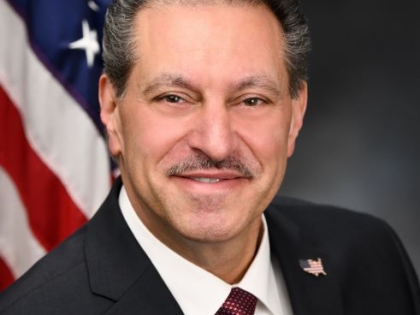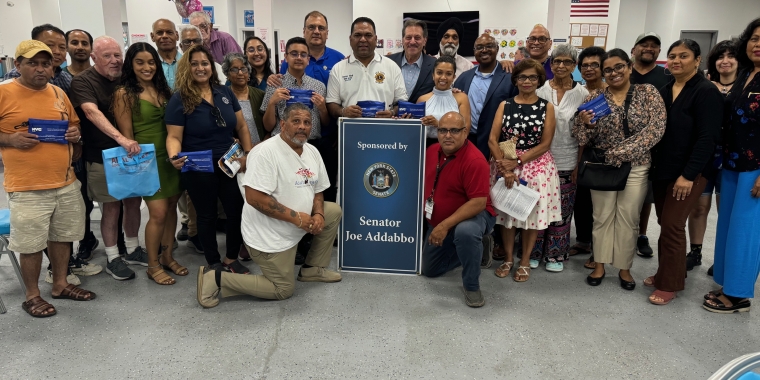
Addabbo Votes in Favor of Legislative Package Designed to Crack Down on Sex Offenders in New York State
Joseph P. Addabbo Jr
July 10, 2012
-
ISSUE:
- Crime
- Child Molestation
One Initiative Would Bar Sex Offenders on Parole or Probation from Entering Public Libraries
Queens, NY, July 10, 2012 -- In order to better protect New Yorkers from possible harm by convicted sex offenders, NYS Senator Joseph P. Addabbo, Jr. (D-Queens) voted over the course of the 2012 legislative session to approve a wide variety of Senate bills designed to increase penalties and otherwise strengthen laws governing the punishment and activities of those who commit sex crimes.
“We’ve made great progress in recent years to ensure that neighborhoods are informed when a sex offender moves in, that offenders are prevented from straying too close to areas where children gather, and that steps are taken to decrease the possibility that additional sex crimes will be committed,” said Addabbo. “But given the severity of these crimes, and the terrible physical and psychological damage that perpetrators can inflict upon their victims, we need to make sure that our laws are effective and that any loopholes are addressed.”
Addabbo pointed to news reports over this past weekend that a registered sex offender was arrested for allegedly fondling two young girls in a Flushing, Queens, public library last month. “One of the bills I supported bars sex offenders who are released on parole or probation from entering public libraries. While the recent offender in Queen had apparently fulfilled the requirements of his sentence, it is still quite clear that he shouldn’t be around children,” Addabbo said, noting that some 200 pieces of legislation have been introduced in the Senate and Assembly to address issues surrounding those who commit sex offenses.
The Queens lawmaker noted that studies have shown that those who commit sex offenses often have high rates of recidivism, and that this behavior, particularly among those who commit repeated or the most serious violent offenses, is not always responsive to rehabilitative efforts. In New York State, sex offenders are designated as “Levels 1, 2, and 3” offenders – with “Level 3” being the most serious and considered the most likely to be a repeat offender.
“We need to try to balance the rights of convicts who have served their sentences with the equally important rights of children and families to be protected from sex crimes,” Addabbo said. “The legislation I have been supporting in the Senate should help to keep us on this path.”
- S.3744A: prohibits sex offenders who are released on parole or probation from entering public libraries;
- S.512A: enables law enforcement officials to inform the public of a “Level 2” sex offender’s place of employment, information already found on the Department of Criminal Justice Services (DCJS) Sex Offender Registry Web site;
- S.597: prohibits sex offenders from receiving or keeping real estate appraiser licenses;
- S.1418: prohibits convicted sex offenders from working or volunteering at any facility where they would be allowed unsupervised access to residential living quarters;
- S.356: automatically designates a convicted sex offender as a “Level 3” sexual predator, the most serious classification, if the crime is committed against a child 10 years-old or younger;
- S.1522: requires sex offenders, upon registering or routinely verifying their addresses with the State Division of Criminal Justice Services Sex Offender Registry, to also provide the names of any schools located within a half-mile radius of their homes;
- S.1542: mandates that those convicted of sex crimes appear at hearings where their designations as “Levels 1, 2, or 3” sex offenders are determined;
- S.1544: increases penalties for sex offenders who fail to register or verify their addresses with the Division of Criminal Justice Services Sex Offender Registry as required by law, or who violate the law prohibiting sex offenders from operating frozen dessert trucks;
- S.487: requires that sex offenders who commit another sex offense while on probation, and then have their probation revoked, serve the sentence for the new crime consecutively, and not concurrently, with their existing sentence;
- S.1857A: prohibits sex offenders from serving as trustees, principals, officers, members of boards of education, or other positions of public trust within schools;
- S.1927: makes it a Class E felony for sex offenders to supply false information regarding their identity or residence when registering or verifying this data with the State’s Sex Offender Registry; and
- S.1365: removes the 10-year “look back” period under which an offender could be charged with persistent sexual abuse, a crime that involves separate criminal convictions of forcible touching, sexual abuse, and other sex crimes over the last decade. By removing the 10-year review period, people with multiple convictions – no matter when or how long ago they occurred – could be charged with the “Class E” felony of persistent sexual abuse.
“All of these bills have one common goal: protecting the people of New York from sex offenders who have committed heinous crimes and who may be at risk of doing it again,” said Addabbo. “I hope we will see some action in this direction when the Legislature returns to the State Capitol later this year to take up unfinished business.”
# # #
--
Judy Close, Press Secretary
NYS Senator Joseph P. Addabbo, Jr.
15th Senate District - Satellite Office
66-85 73rd Place
Middle Village, NY 11379
Ph: 718-497-1630
Share this Article or Press Release
Newsroom
Go to Newsroom

